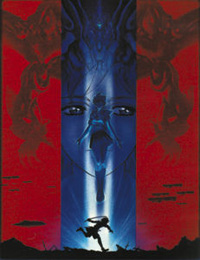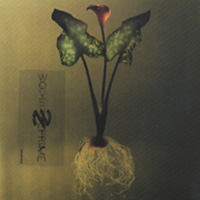 The Vision of Escaflowne
The Vision of Escaflowne
with Kirby Morrow, Kelly Sheridan, Brian Drummond
(Bandai)
By Tim Den
One of Japan’s most popular anime/manga series of the ’90s finally arrives Stateside in the form of eight DVDs (26 episodes in all). Fueled by a complex plot that combines fortune-telling, giant transforming robot armors, social commentary, the concept of “destiny vs. human will,” and traditional anime romance elements, The Vision of Escaflowne transports the audience to a world where the drama of human emotions gets played out in fantasy settings.
Sounds too good to be true? It gets better. Between plot twists, cinematic battles, and philosophical debates, make sure you never take your attention away from the screen. Whether it’s a life-or-death fight scene or the inner struggles of a scientist hellbent on determining the logics of “fate,” The Vision of Escaflowne succeeds in creating a fantasy-romance-battle-theoretical hybrid only the best anime achieves.
The story begins with a high school girl from Earth (Hitomi) seeing visions of another world… of giant battle armors, royal family disputes, and a delicate balance with nature. As Hitomi tries to ignore these visions and concentrate on her track and field career (not to mention her crush on the men’s team captain), a mysterious young man (Van) transports to Earth and collides with Hitomi’s teenage life. By accident, both Hitomi and Van are transported back to Van’s planet (Gaea; the same world Hitomi has been having visions of), where Van is soon to be crowned king of his country (Fanelia). But all is not well: A sneak attack by the Zaibach empire completely destroys Fanelia, with Van and Hitomi barely escaping with the legendary Escaflowne dragon armor. And here’s where everything shifts into high gear and never lets up (and we’re only at episode two!).
As Van learns to control his adolescent temper (and navigate Escaflowne), Hitomi starts to realize that her visions are prophecies. As she fine-tunes her “sixth sense,” she helps Van locate pieces of the puzzle that will eventually lead to his revenge on Zaibach. What are the pieces? Well, let’s see: The teaming up with a noble knight named Allen, the revelation that Van’s brother Folken works for Zaibach, the dark past of the main characters, the intertwining romance between Van, Hitomi, and Allen, Zaibach’s “fate altering engine,” the quest for Atlantis, the realization that the souls of Atlantis govern Gaea, the true purpose of the Escaflowne armor, the truth behind Zaibach emperor Dornkirk, not to mention detailed explorations of personal relationships between every character. Loyalty, love, admiration, self-sacrifice, betrayal, regret, and every other real-world issue and emotion gets tackled along the way, too. You dizzy yet?
If not, wait until you get a load of the animation. Though drawn closer to the “soft” approach of girl-oriented anime, The Vision of Escaflowne‘s attention to detail more than makes up for the usual “doughy eyed, slender-faced” renderings. Airships (which use floating stones instead of engines to levitate), stealth-cloaked enhanced robots (courtesy of some brilliant CGI touch-ups – something this series pioneered), and sprawling kingdoms are all done with finesse, making a world where man-beasts (dolphin people? Wolf people?) seem as real as the grocery store down the block. Orchestral scores snugly cue every clang of the giant robots’ swords, as every snarl of the lips conveys a wealth of sentiments. This is what the best anime is capable of.
Not that the story needs to dazzle you with eye candy. Like many of the best anime titles, The Vision of Escaflowne dares to take the road less traveled in terms of plot. Would an American cartoon take on the logic of destiny and fate? The struggle between doing what’s expected of you and what you truly desire? The ambition of conquest inside every human soul? The parental neglect that haunts you in your adult life? The possibility of human will and love overcoming death, destruction, and the most daunting of odds? Most American films don’t even take on this much weight. It’s no wonder this series has captivated audiences worldwide since its inception.
With North America steadily more interested in the art of anime, The Vision of Escaflowne will be a formidable addition to already-hits such as Cowboy Beebop, Dragonball Z (though not its watered-down, cheesy voice-over, violence-less Cartoon Network version), Tri Gun, and the Gundam franchise.
(www.bandai.com)



